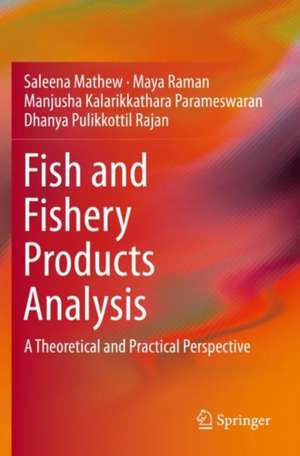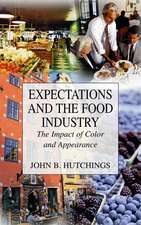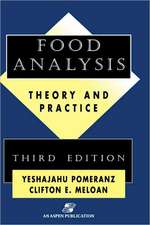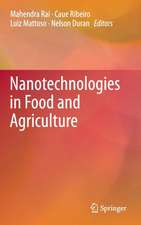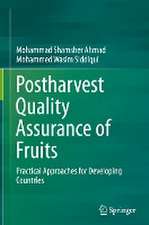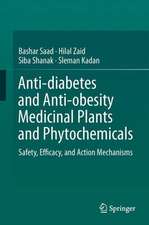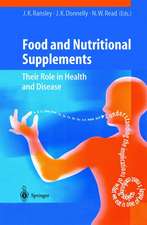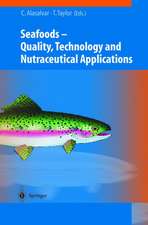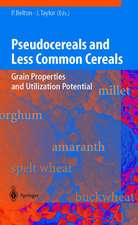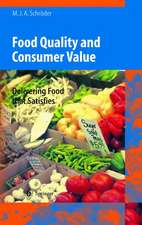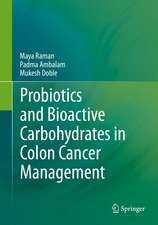Fish and Fishery Products Analysis: A Theoretical and Practical Perspective
Autor Saleena Mathew, Maya Raman, Manjusha Kalarikkathara Parameswaran, Dhanya Pulikkottil Rajanen Limba Engleză Paperback – 18 noi 2020
| Toate formatele și edițiile | Preț | Express |
|---|---|---|
| Paperback (1) | 573.34 lei 38-44 zile | |
| Springer Nature Singapore – 18 noi 2020 | 573.34 lei 38-44 zile | |
| Hardback (1) | 589.27 lei 38-44 zile | |
| Springer Nature Singapore – 18 noi 2019 | 589.27 lei 38-44 zile |
Preț: 573.34 lei
Preț vechi: 716.68 lei
-20% Nou
Puncte Express: 860
Preț estimativ în valută:
109.72€ • 114.13$ • 90.58£
109.72€ • 114.13$ • 90.58£
Carte tipărită la comandă
Livrare economică 10-16 aprilie
Preluare comenzi: 021 569.72.76
Specificații
ISBN-13: 9789813295766
ISBN-10: 9813295767
Pagini: 443
Ilustrații: XVII, 443 p. 106 illus., 12 illus. in color.
Dimensiuni: 155 x 235 mm
Ediția:1st ed. 2019
Editura: Springer Nature Singapore
Colecția Springer
Locul publicării:Singapore, Singapore
ISBN-10: 9813295767
Pagini: 443
Ilustrații: XVII, 443 p. 106 illus., 12 illus. in color.
Dimensiuni: 155 x 235 mm
Ediția:1st ed. 2019
Editura: Springer Nature Singapore
Colecția Springer
Locul publicării:Singapore, Singapore
Cuprins
Assessment of Nutritional Quality of Fish.- Fish and Fish Products: Quality Indices.- Water/ Ice: Assessment of Quality.- Toxicants: Assessment of Quality.- Techniques used in Fish and Fishery Products Analysis.- Waste Management in Seafood Industry.- Bioactive Compounds from Marine Sources.
Notă biografică
Prof Dr. Saleena Mathew has got over 35 years of research experience of which 30 years of teaching at Post Graduate level. Was Director, School of Industrial Fisheries, Cochin University of Science & Technology for one term of 3 years from 2005 to 2008 and retired from the University as Professor in 2016.For the last 27 years of service, was engaged in teaching and research in the field of Fish Processing Technology and Fish Biochemistry at the School of Industrial Fisheries, Cochin University of Science & Technology and catered trained personnel for the seafood industry. Is a recognized guide of Cochin University of Science and Technology for the last 25 years. Served as expert member and chairperson of various Scientific and Academic Bodies of Cochin University of Science & Technology and as expert member for various programs of other universities and research institutes. Was appointed as Associate member of The World Academy of Sciences (TWAS), Italy in 1998 and has visited Argentina, Italy and other foreign countries as part of research work. Has coordinated and conducted various symposia, workshops and training programs at the School in the field of fish processing, quality assurance and food safety. Has got more than 50 research publications in the specialized areas of biochemistry, fish preservation and bioactive substances from fish and fish discards.
Dr. Maya Raman is presently working as Associate Professor (Meat and Fish Processing), Kerala University of Fisheries and Ocean Studies, Cochin. She graduated in Botany, and received her M.Sc. (Industrial Fisheries) and Ph.D. Degree from School of Industrial Fisheries, Cochin University of Science and Technology, India in 2006. Her doctoral area of study was in Fish Biochemistry and Fish Processing Technology. She also worked as Post doc at Applied Nutrition and Food Chemistry, Centre for Chemistry and Chemical Engineering, Lund University with the scholarship from Erasmus Mundus External Cooperation Windows Lot 15 Programme. She also worked as Women Scientist at Indian Institute of Technology Madras with the Women Scientist Scheme (WOS-A) Funding by Department of Science and Technology, India. She was selected as Young Student Speaker IFCON 2003 by Association of Food Scientists and Technologists, India. She also worked as faculty at Department of Food Science and Technology, MACFAST, as certified Technologist (Export Inspection Authority, India) at Koluthara Exports Limited, and as Research Officer at NGIL, India. She has 17 peer-reviewed publications to her credit and has published a book and 8 book chapters. She has also presented in 14 papers at national and international symposia/ conferences. Her area of expertise is fish biochemistry (collagen), fish processing technology, nutrition and health (cancer), nanotechnology, bioactive marine compounds, dietary fibers (cereal, vegetable, marine algae) and colon cancer (in vitro and in vivo), molecular modelling and dynamics, gut simulation techniques, drug encapsulation, hydrogels, antimicrobial biodegradable food wraps etc. She is also life member of AFST(I), SOFT(I), SASNET, member of ACS. She also qualified NET conducted by ASRB in 2001. A patent on hydrogel from cyclic beta-glucan for cosmetics/ food applications has also been filed in 2016.
Dr. Manjusha Kalarikkathara Parameswaran graduated in Zoology at the St. Teresa’s college Ernakulam and attained the M Sc. in Biochemistry from School of Biosciences, Mahatma Gandhi University in 2002. She qualified the joint UGC- CSIR National Eligibility Test (NET) in 2002 and was awarded Junior Research Fellowship (2004-2009). She has also qualified the NET (Plant Biochemistry) conducted by ASRB-ICAR in 2018. She was awarded the Ph.D. in Marine Sciences (Biochemistry) for the studies pertaining to the bioactive potential of glycosaminoglycan’s in cephalopods from School of Industrial Fisheries, Cochin University of Science & Technology (CUSAT), India, in 2011. She has worked as faculty in Biochemistry at Mar Athanasius College Kothamangalam, St. Mary’s College Thiruvalla, School of Aquatic Food Products and Technology – Kerala University of Fisheries and Ocean Studies (KUFOS) and at the Department of Marine Biology, Microbiology and Biochemistry – School of Marine Sciences, CUSAT. She is a lifetime member of the Society of Marine Biologists (SOMB) and Annual member of the Society of Fishery Technologists - India (SOFT-I). She has published three papers and presented six articles in various National and International conferences. Her research interests are Marine bio actives, Biopolymer hydrogels.
Dr. Dhanya Pulikkottil Rajan is presently working as Assistant Professor at M.E.S Asmabi College, Thrissur. She also worked as faculty at School of Industrial Fisheries, Cochin University of Science and Technology (CUSAT) and St.Albert’sCollege, Ernakulam. She is a post-graduate in Industrial Fisheries from CUSAT and holds doctoral degree in Marine Sciences. Her doctoral study investigated the effects of spice oleoresins in microbial decontamination and their potential application in quality stabilization of tuna (Euthynnus affinis) during storage. She has qualified National Eligibility Test under Indian Council of Agricultural Research in 2013 and is a Lifetime member of Society for Fishery Technologist (India). She has 5 years of teaching and 4 years of research experience in the field of fish processing. She had worked as certified Technologist at CAP Seafoods, Kerala, before pursuing research. Her research interests include biopreservation, enhancement of safety and sensory qualities, value addition and microbial spoilage of seafood products by psychrotrophic and histamine forming bacteria. She has presented/ published 14 research papers in various international and national journals/conferences and published one book chapter.
Dr. Maya Raman is presently working as Associate Professor (Meat and Fish Processing), Kerala University of Fisheries and Ocean Studies, Cochin. She graduated in Botany, and received her M.Sc. (Industrial Fisheries) and Ph.D. Degree from School of Industrial Fisheries, Cochin University of Science and Technology, India in 2006. Her doctoral area of study was in Fish Biochemistry and Fish Processing Technology. She also worked as Post doc at Applied Nutrition and Food Chemistry, Centre for Chemistry and Chemical Engineering, Lund University with the scholarship from Erasmus Mundus External Cooperation Windows Lot 15 Programme. She also worked as Women Scientist at Indian Institute of Technology Madras with the Women Scientist Scheme (WOS-A) Funding by Department of Science and Technology, India. She was selected as Young Student Speaker IFCON 2003 by Association of Food Scientists and Technologists, India. She also worked as faculty at Department of Food Science and Technology, MACFAST, as certified Technologist (Export Inspection Authority, India) at Koluthara Exports Limited, and as Research Officer at NGIL, India. She has 17 peer-reviewed publications to her credit and has published a book and 8 book chapters. She has also presented in 14 papers at national and international symposia/ conferences. Her area of expertise is fish biochemistry (collagen), fish processing technology, nutrition and health (cancer), nanotechnology, bioactive marine compounds, dietary fibers (cereal, vegetable, marine algae) and colon cancer (in vitro and in vivo), molecular modelling and dynamics, gut simulation techniques, drug encapsulation, hydrogels, antimicrobial biodegradable food wraps etc. She is also life member of AFST(I), SOFT(I), SASNET, member of ACS. She also qualified NET conducted by ASRB in 2001. A patent on hydrogel from cyclic beta-glucan for cosmetics/ food applications has also been filed in 2016.
Dr. Manjusha Kalarikkathara Parameswaran graduated in Zoology at the St. Teresa’s college Ernakulam and attained the M Sc. in Biochemistry from School of Biosciences, Mahatma Gandhi University in 2002. She qualified the joint UGC- CSIR National Eligibility Test (NET) in 2002 and was awarded Junior Research Fellowship (2004-2009). She has also qualified the NET (Plant Biochemistry) conducted by ASRB-ICAR in 2018. She was awarded the Ph.D. in Marine Sciences (Biochemistry) for the studies pertaining to the bioactive potential of glycosaminoglycan’s in cephalopods from School of Industrial Fisheries, Cochin University of Science & Technology (CUSAT), India, in 2011. She has worked as faculty in Biochemistry at Mar Athanasius College Kothamangalam, St. Mary’s College Thiruvalla, School of Aquatic Food Products and Technology – Kerala University of Fisheries and Ocean Studies (KUFOS) and at the Department of Marine Biology, Microbiology and Biochemistry – School of Marine Sciences, CUSAT. She is a lifetime member of the Society of Marine Biologists (SOMB) and Annual member of the Society of Fishery Technologists - India (SOFT-I). She has published three papers and presented six articles in various National and International conferences. Her research interests are Marine bio actives, Biopolymer hydrogels.
Dr. Dhanya Pulikkottil Rajan is presently working as Assistant Professor at M.E.S Asmabi College, Thrissur. She also worked as faculty at School of Industrial Fisheries, Cochin University of Science and Technology (CUSAT) and St.Albert’sCollege, Ernakulam. She is a post-graduate in Industrial Fisheries from CUSAT and holds doctoral degree in Marine Sciences. Her doctoral study investigated the effects of spice oleoresins in microbial decontamination and their potential application in quality stabilization of tuna (Euthynnus affinis) during storage. She has qualified National Eligibility Test under Indian Council of Agricultural Research in 2013 and is a Lifetime member of Society for Fishery Technologist (India). She has 5 years of teaching and 4 years of research experience in the field of fish processing. She had worked as certified Technologist at CAP Seafoods, Kerala, before pursuing research. Her research interests include biopreservation, enhancement of safety and sensory qualities, value addition and microbial spoilage of seafood products by psychrotrophic and histamine forming bacteria. She has presented/ published 14 research papers in various international and national journals/conferences and published one book chapter.
Textul de pe ultima copertă
This novel and informative book discusses the various aspects of seafood quality. The book is divided into 7 broad sections, each tackling a different aspect. The first section covers the general aspects relevant to the nutritional quality of the fish and the various extraction protocols for macro-/ micro-nutrients. The second section provides insights into handling and the principles of thermal and non-thermal processing techniques for commercially important fishery products. The quality standards and safety concerns in the seafood industry and consumption are discussed in this section. The freshness indices of the processed products including biochemical, microbiological and toxicological characteristics are also included. The third section discusses the physico-chemical characteristics and quality parameters of potable water/ ice. The fourth section includes the quality assessment of various toxicants related to seafood products. The fifth section deals with the specific aspects such as principle, instrument and procedures of conventional and novel analytical instruments relevant to the seafood industry. The sixth section deals with the seafood waste management including solid and liquid seafood wastes. Presently, there is a great awareness regarding environmental sustainable processing/ preservation techniques. The final chapter discusses the bioactive compounds from under-utilized marine sources showing pharmaceutical/ nutraceutical applications.
Caracteristici
Comprehensively discusses the different aspects of seafood, from nutritional quality to assessment of toxicants Discusses the quality of water used for growing and cooking seafood Provides insights into waste management through bioremediation, anaerobic treatment, filtration etc.
